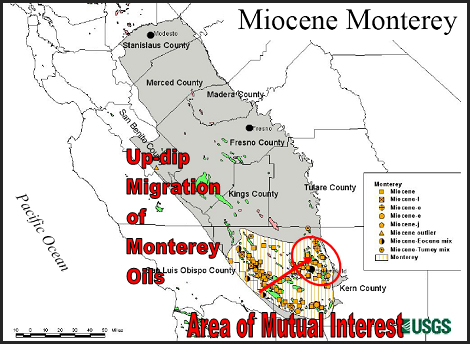‘Fracking’ update
Posted on | February 16, 2011 | 2 Comments

USGS map of the Monterey Shale formation doctored by an energy website "OilShaleGas.com." Click on the map to see if you live in "an area of mutual interest."
It’s been an interesting couple of weeks to do with “fracking” or the mining technique more properly called hydraulic fracturing. The Los Angeles Times reports that the oil and gas industry has written the Academy of Motion Pictures attacking the Oscar-nominated documentary “Gasland” as riddled with inaccuracies. T. Boone Pickens appeared on the Daily Show claiming, “I have fracked 3,000 wells in my life” and that “they always say that it contaminates the aquifer. I’ve never seen that happen.” Meanwhile, though the gas industry agreed to discontinue the use of diesel in fracking fluids in 2004, a congressional investigation reported late last month that more than 32 million gallons of it was used anyway. AP reports that fracking is a coming technique to open up not just gas but also oil exploration in Wyoming, Colorado, Nebraska, Kansas, New Mexico, Texas and California. The Monterey, California blog BigSurKate offers a respectful report of a familiar and chilling spectacle — Bureau of Land Management officials introducing energy companies to locals, who may or may not appreciate the ease and enormity of the slippage that can happen when federal land managers get together with good buddies from the energy industry, coke and sex parties or no. Finally, EPA administrator Lisa Jackson recently announced a federal re-review of the safety of fracking following a dubious agency blessing of the technique under the Bush administration. An update of fracking stories with links follows after the jump. For a detailed review of articles on fracking published last summer going back through the Bush administration along with links to federal reports, click here.
“There may be a need for a federal role – we simply don’t know.” — Environmental Protection Agency administrator Lisa Jackson on pending federal study on fracking and drinking water, Fracturing to get close look but EPA administrator says it’s no guarantee more regulation ahead, Houston Chronicle, February 2, 2011
“Our level of concern is very high anytime the EPA is involved.” — Ron Ness, president of the Petroleum Council, on the Environmental Protection Agency’s proposed study on the impact of hydraulic fracturing on drinking water, EPA’s study into oil industry’s fracking process includes North Dakota, Grand Forks Herald, February 10, 2011
Using diesel in fracturing fluids without obtaining government approval apparently violates the Safe Drinking Water Act … — Details scarce on diesel use, Wilkes-Barre Citzens’ Voice, February 3, 2011
Although many companies said they had eliminated or were cutting back on use of diesel, 12 companies reported having used 32.2 million gallons of diesel fuel, or fluids containing diesel fuel, in their fracking processes from 2005 to 2009 … Approximately half the total volume was deployed in Texas, but at least a million gallons of diesel-containing fluids were also used in Oklahoma (3.3 million gallons); North Dakota (3.1 million); Louisiana (2.9 million); Wyoming (2.9 million); and Colorado (1.3 million). — Gas Drilling Technique Is Labeled Violation, New York Times, January 31, 2011
“Whether the E.P.A. has the chutzpah to try to impose retroactive liability for use of diesel in fracking, well, everyone is in a wait-and-see mode.” — Matt Armstrong of Bracewell & Giuliani, a Washington DC law firm representing oil and gas companies, Gas Drilling Technique Is Labeled Violation, New York Times, January 31, 2011
A 2005 law exempted all chemicals used in hydraulic fracturing except diesel fuel from federal regulations aimed at protecting drinking water. In 2003, three of the largest drilling companies signed an agreement with the Environmental Protection Agency to eliminate use of diesel fuel in coal bed methane formations in underground sources of drinking water. That agreement, coupled with the 2005 law, led many to assume the industry had stopped using diesel fuel altogether in hydraulic fracturing … — Drillers used diesel in ‘fracking,’ report says, Tulsa World, February 1, 2011
“Halliburton does not believe that the company’s hydraulic fracturing activities have resulted in a violation of the Safe Drinking Water Act or any other federal environmental law. There are currently no requirements in the federal environmental regulations that require a company to obtain a federal permit prior to undertaking a hydraulic fracturing project using diesel.” — Halliburton spokeswoman Teresa Wong, Drillers used diesel in ‘fracking,’ report says, Tulsa World, February 1, 2011
When congressional investigators asked drilling companies for data on proximity of their wells to underground water sources, according to the report, none provided data, claiming they did not track that information. — Undesirable element: Industry and regulators need to address the issues raised by diesel in fracking, Houston Chronicle editorial, February 3, 2011
On Saturday, February 5, Monterey County Supervisor Simon Salinas, County Planning Staff, BLM staff, a Western States Petroleum Association representative, citizen groups, and Planning Commissioner Chair Jay Brown, addressed a public meeting at Lockwood’s Community Center at Harden Square, responding to citizen concerns about the expanding oil and gas development in the Third District of Monterey County. — Fracking meeting in Lockwood, BigSurKate, February 7, 2011
Water would be extracted from the sludge, and then the sludge — which would still contain the components that the companies’ want removed from the frack water — would be trucked to a landfill in a 20-yard covered construction Dumpster … — Wyalusing supervisors to announce decision on permit for controversial fracking plant, The (Towanda, Pennsylvania) Daily Review, February 12, 2011
The [Delaware River Basin] commission anticipates there could be as many as 10,000 wells drilled in the watershed it oversees, primarily in northeastern Pennsylvania and southern New York … — New gas drilling rules address ‘fracking’ concerns, Philadelphia Inquirer, December 9, 2010
“I’ve heard people say their water was contaminated. But I don’t believe it’s caused by fracking.” — Former Pennsylvania governor Tom Ridge, now consultant to gas drilling lobby the Marcellus Shale Coalition, Ridge defends shale drilling, Pittsburgh Post-Gazette, February 4, 2011
New York State urgently needs more jobs and new tax revenue, so naturally its political class has decided to reject one of the best economic opportunities in decades. — The madness of New York: A tale of two states exploiting the boom in shale natural gas, editorial, Wall Street Journal, December 16, 2010
In America, landowners are given production royalties. In Europe the hydrocarbons are considered government property, so locals get less for their troubles and are more likely to object. — Scramble for shale gas riches; Explorers are now rushing to Blackpool, UK Sunday Times, December 12, 2010, via ProQuest
“We’ve completely transformed the natural gas industry, and I wouldn’t be surprised if we transform the oil business in the next few years too.” — Aubrey McClendon, chief executive of Chesapeake Energy, New drilling method opens vast oil fields in the US, Associated Press, February 9, 2011
Comments
2 Responses to “‘Fracking’ update”
Leave a Reply



February 16th, 2011 @ 1:12 pm
Thanks for covering this problem, and for the in-depth reporting and links to other sources. This is a problem that ought to be of concern to ALL of us.
For the Monterey County fracking, it can affect the water supply for the Salad Bowl of America, and the food produced here, introduced from supermarket shelves throughout the nation, that finds itself to your kitchen table could be contaminated.
February 16th, 2011 @ 1:14 pm
Backatcha Kate. Very nice job covering the meeting.